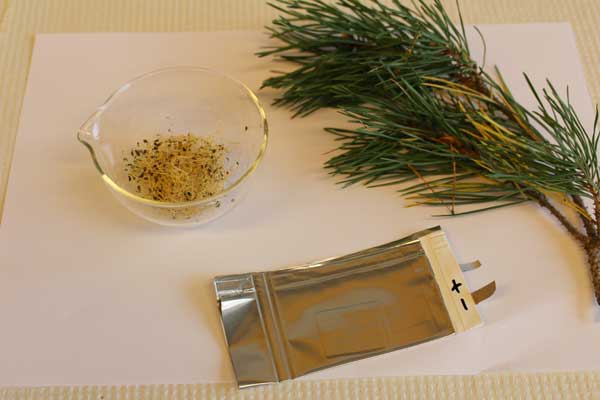
[Image above] Researchers at Uppsala University (Sweden) have developed an alternative to the lithium battery—an alfalfa and pine resin-based organic battery that can be recycled and recovered. Credit: Daniel Brandell; Uppsala University
Though it’s relegated to nothing more than one of Mother Nature’s prickly pests for 11 months out of the year, the holiday season is the pine tree’s time to shine. I mean, how many other trees have (numerous) songs written about them?
There’s “O Christmas Tree” (better known as O Tannenbaum to you traditionalists), “Rockin’ Around the Christmas Tree,” and my favorite soon-to-be-classic “Underneath the Tree”—and those are just a few with “tree” in the title.
But because we are fickle (and forgetful) folks, we quickly toss aside our “how lovely are your branches” to make room for all the new stuff we acquire on Christmas morning.

Eagerly anticipating December—Nothing quite says home like my parents’ Christmas tree. Credit: Jessica McMathis
New research into ecofriendly batteries, however, might stop us from trashing those trees too quickly this winter.
Researchers at Uppsala University (Sweden) have developed an alternative to the lithium battery—an alfalfa (this one, not this one) and pine resin-based organic battery that can be recycled and recovered.
Their work, published in ChemSusChem, is, according to an Uppsala news release, “a whole new battery concept.”
That concept isn’t the use of renewable materials, it’s the “recycling and recovery strategy,” which researchers say is “wholly new.”
Current lithium-ion options offer both high-power promise along with their fair share of problems (think resources and environmental impact)—one of which is the difficulty with which lithium can be recovered from the inorganic materials used to make Li-ions.
Thanks to Mother Nature, the Uppsala team’s organic offering doesn’t have that problem.
Both alfalfa (lucerne seed) and pine resin are “renewable biological material with an energy content corresponding to that of current lithium-ion batteries,” says the release. Further, “Components of the battery are made of renewable organic biomaterials from alfalfa and pine resin, and can be recycled with a low energy input and non-hazardous chemicals, such as ethanol and water.”
“We think our discovery can open several doors to more environment-friendly, energy-efficient solutions for the batteries of the future,” says Uppsala’s Daniel Brandell, senior lecturer in the university’s department of chemistry and one of the paper’s coauthors.
Their recycled battery, created from the lithium extracted from a spent battery and additional biomaterial, performed just as well as a new battery—well, almost, if you count an energy output close to 99 percent of the original. The team, which also includes Kristina Edström and Stéven Renault, believes that modifications could push that output even higher.
“The use of organic materials from renewable sources makes it possible to solve several of the problems that would arise from a huge rise in the use of lithium batteries,” says Brandell. “But above all, it’s a major step forward that, to a high degree and in a simple, environment-friendly way, the lithium from these batteries can be recovered. These solutions are also potentially very cost-effective.”
The paper is “Environmentally-friendly lithium recycling from a spent organic Li-ion battery“ (DOI: 10.1002/cssc.201402440).
Author
Jessica McMathis
CTT Categories
- Biomaterials & Medical
- Electronics
- Energy
- Environment
- Material Innovations



